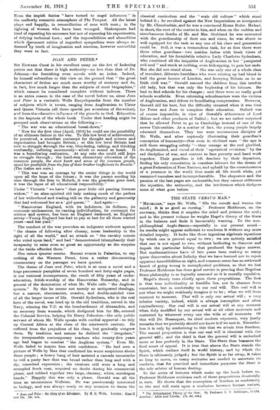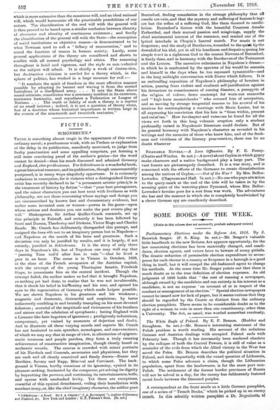THE STATE VERSUS MAN.* " HEGICLIAN," says Mr. Wells, "
fills the mouth and warms the mind ; it is as good as cursing." Professor Hobhouse, on the contrary, thinks that it empties the mind and poisons the soul ; and in the present volume he weighs Hegel's theory of the State in the balance and finds it lamentably wanting. To the non- philosophical Anglo-Saxon—espeCially in our present mood— its results might appear sufficient to condemn it without any more detailed inquiry. It looks like those ingenious algebraic equations by whioh one is proved equal to two ; we are entirely satisfied that one is not equal to two, without bothering to discover and impale the particular fallacy that produced the bogus answer. But mathematicians have of late years been making so many queer discoveries about Infinity that we have learned not to reject apparent inoredibillties on sight, and common-sense has an awkward knack of going wrong in metaphysical problems, so that we feel Professor Hobhouse has done good service in proving that Hegelian State-philosophy is as logically unsound as it is morally repulsive. Hegel's theory rests chiefly upon three propositions. The first is that true individuality or freedcfm lies, not in absence from constraint, but in conformity to our real will. This real will is not what we might recklessly imagine it to be ; what we will from moment to moment. That will is only our actual will ; a very inferior variety, indeed, whioh is always incomplete and often contradictory. Our real will is our actual will at any moment when duly modified by our actual will at all other moments and corrected by whatever every one else wills at all momenta. Of this will Dr. Bosanquet, its chief modern exponent, very justly remarks that we probably should not know it if we met it. Neverthe- less it is only by conforming to this that we attain true freedom. The second proposition is that our real will is identical with the general will ; and the third is that the general will is embodied more or less perfectly in the State. The State thus beoomes the final court of appeal. It is true that above the State stands the Spirit, which realizes itself in world history, and by which the State is ultimately judged i but the Spirit is so far away, it takes so long to move, so many centuries are needed to ascertain its verdicts, that for practical and immediate pnrposes the State is the sole arbiter of human destiny. In the series of lectures which make up the book before us, Professor Hobhouse criticizes each of these propositions drastically in turn. He shows that the conception of freedom as conformity to the real will rests upon a confusion between human nature,
• The Mtlaphyliall Theory of the state. By Professor L. T. If obhoisse, D.Litt. London : Allen and Unwin. tid. net.)
which is more extensive than the oonscious will, and an ideal rational will, whioh would harmonize all the practicable possibilities of our nature. The identification of the real will with the general will is then proved to be based upon a similar confusion between identity of character and identity of continuous existence ; and finally the identification of the general will with the State—the conception of social institutions as objective reason—is demonstrated to be what Newman used to call a " fallacy of enumeration," and to annul the function of reason in human society. Lastly, some general applications of the theory are considered and shown to conflict with all normal psychology and ethics. The reasoning throughout is lucid and vigorous, and the style as non-technical as the subject will admit. It is chiefly a work of destruction, but destructive criticism is needed for a theory which, in the sphere of politics, has worked in a large measure for evil :— " It combats the spirit of freedom in the most effective manner possible by adopting its banner and waving it from the serried battalions of a discrplined army. . . . It sets the State above moral criticism, constitutes war a necessary incident in its existence, contemns humanity, and repudiates a Federation or League of Nations. . . . The truth or falsity of such a theory is a matter of no small interest ; indeed, it is not a question of theory alone, but of a doctrine whose historical importance is written large in the events of the nineteenth and twentieth centuries."



































 Previous page
Previous page